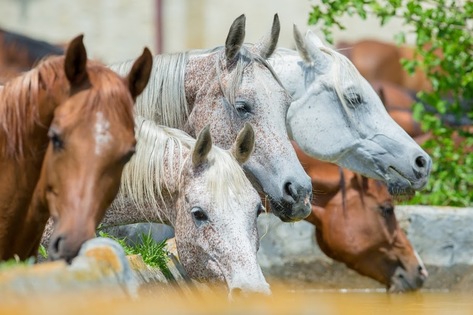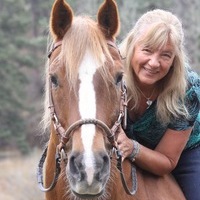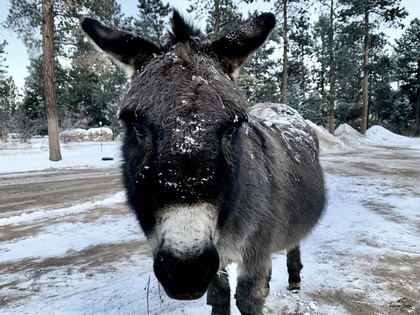
The Most Popular Horse Breeds Of 2019
Equestrian Advice & Guides General Equestrian
Build your business profile for FREE and expose your services to thousands of potential clients!
Create my profile now!
To me, the question of horses mourning the loss of a herd mate is a no-brainer; of course they feel loss and mourn when a companion dies! But when I step away from my own anthropomorphizing tendencies, I ask myself, do they really? And if so, how do we help them process the loss, or, do we just let them be and they’ll eventually figure it out on their own?
It’s been two weeks and two days since we said goodbye to Gazahna (https://www.horseclicks.com/community/advice/equestrian/3-1-2) and although I’m still struggling with her being gone, the two geldings in my pasture seem to have accepted the fact and have moved through their grief. Their acceptance helps me get through every day, every visit to the barn and through every visit to them. Since my horses live near my house, we spend a lot of time together. They get fed small amounts often during the day, and I know their sleep patterns and daily routines quite well. Their ability to move on is helpful to me, yet I wonder how deeply they feel the loss and how they mourn.
The day we said goodbye to Zahna, one gelding was at the vet hospital with us and I wanted him to see that she was gone. He had been in a stall where he could witness everything going on—from her getting shot after shot of painkiller and sedative, to when we finally euthanized her. Darby, though, was not with us and had no idea of her demise.
When it was over, I got Luke from the stall and led him to where her still body lay. I let the rope out almost to the end so he had the option of going up to her or not. He didn’t hesitate, and approached her with lowered head; eyes wide, nostrils flared, body tense. He didn’t touch her, but he did lower his nose to within a couple of inches from her. After a moment, he stepped back and I waited to see if he was done or if there would be more to his farewell. He checked out her barrel, flank, legs and then breathed deeply near her face. He gently touched his lip to her neck, stood for a moment longer, and then asked to leave.
As we left the clinic, he never looked back. Never called for her, never got anxious. As always, he self-loaded into the trailer and began nibbling on the hay in the manger. His eyes were not their normal soft selves, but he wasn’t frantic, either. I noticed tension wrinkles around the corners of his mouth and under his eyes. His ears were not swiveling, but they weren’t completely relaxed, either. I felt he was fully aware that Zahna wasn’t coming with us and he didn’t need to look for her or call to her. He just wanted to go home. Now, I could be making it all up, imagining what he was thinking and feeling, but this is what I saw him do. Through my tears, I told him he was a good boy and left him for the ride home.
My other horse, Darby, had been babysitting a mini donkey following the euthanization of a horse who’d been his friend and companion. I wondered if Darby being gone had been the cause of my mare to colic and whether I’d inadvertently killed her by offering my horse to the donkey for support. I’ll never know, but since we could not save Gazahna, in the end, it doesn’t matter. If I had it to do over I’d likely bring the donkey to our house instead, but really, the same outcome is just as likely, because horses colic and often, we can’t save them. We always second-guess ourselves and our decisions, don’t we? I suppose that’s just part of sharing our lives with animals we love as family.
We drove to where Darby was staying and Luke called out to him. And Darby answered. Both horses were animated as I opened the trailer window to let them say hi after their two day hiatus. They shared breath longer than they usually do and when both settled, I opened the door to let Darby load next to Luke. We drove home and stopped in the driveway to offload. Usually, when we get home, the horses will call to one another, but this time, it was only these two coming back to an empty paddock. Nobody said anything, they just got out, went into their corral, asked for dinner and began eating as if nothing had happened.
They seemed to not notice or care than their mare wasn’t with them. And this makes sense for Luke, but how did Darby know? Or did he? Or did he simply accept that only he and Luke were left? Was it because of his absence that coming home to only the two of them, it didn’t matter? I find each of these explanations to fall short. Darby never accepted the absence of either of the other two. He’d holler and pace and you’d have thought the world was ending, but in this case, he never showed any worry about it only being he and Luke now.
I left to go get the donkey so he’d have company at our house and again, no calls from either horse as I drove out. Odd barely describes this behavior since my horses call to any trailer they believe holds a horse, even a small U-Haul will garner a response. So why the silence now? Especially from Darby, who couldn’t possibly know that Gazahna was dead.
I returned with the donkey in the trailer about thirty minutes later. No calls from Luke or Darby at seeing their trailer (this had never happened before) and no calls to the donkey when I led him through their paddock. No one said anything that night, the next morning, the next afternoon when I loaded the donkey to take him home, or when I returned with the trailer. My horses have never not called to any horse trailer coming or going. Never.
I figured we were all feeling the vast crater of Gazahna being gone and I prepared the homeopathic remedy, Ignacia amara, for each of us, including the donkey. We’d all suffered losses and we all needed as much help as we could gather. I did Reiki on each of us and body work on the horses and donkey. I am guessing it helped because no one else suffered a bout of colic, and they all ate and drank as usual.
But still, for three days afterward, only silence greeted me whenever I approached the barn, drove in or out, or pulled the trailer past them. I was worried and saddened by their lack of vocalizations. True, Zahna was always the loudmouth of the group, but the boys were usually a little bit vocal. The silence was killing my heart and I cried at the quiet. I asked them if maybe they could call out so it would not be so eerily still. I told them I needed to hear their voices if maybe they wouldn’t mind. Did they understand, or was I just such an emotional mess that I hoped they did?
The next morning, when I went out to the barn, Luke nickered and Darby joined in. I cried into both of their necks in thanks and gave them each a treat. Learning to live without our girl has been tough and although the pain is still with me, the horses seem to have accepted her being gone far easier than I have.
Here are some things you can do to help your horse (and yourself) following the loss of a herd mate.
The truth is, loss hurts and we must not avoid feeling the pain, but rather, remember that while it’s good to feel, it’s not good to stay mired in the grief. If you find you are struggling to lift your head again, seek whatever help you feel necessary and feel no shame in doing so. On the other hand, if you come out of your grieving state easier than you’d think, it’s not an indication of loving less or not enough. Each horse and each person is different and we all process our emotions differently. Give it time, get help as needed and remember the good times.
Personally, I have found that crying into the mane of another horse and inhaling the smell of hay, dirt and yes, even the aroma of manure to be quite beneficial. Listening to my other horses chew, feeling their warm breath on my cheek, watching them race across a field and running my palm over one of their eyes are all highly therapeutic.
Ride when you’re able and don’t be surprised to find yourself crying over some unexpected or seemingly stupid thing. The words that tumble through my mind every ride now is that I need to remember riding the wind and learn to ride sand. That’s how different my horses are.
Hug your horse, love them Happily Ever After,
~Tanya Buck
Free stuff here: TanyaBuck.com

